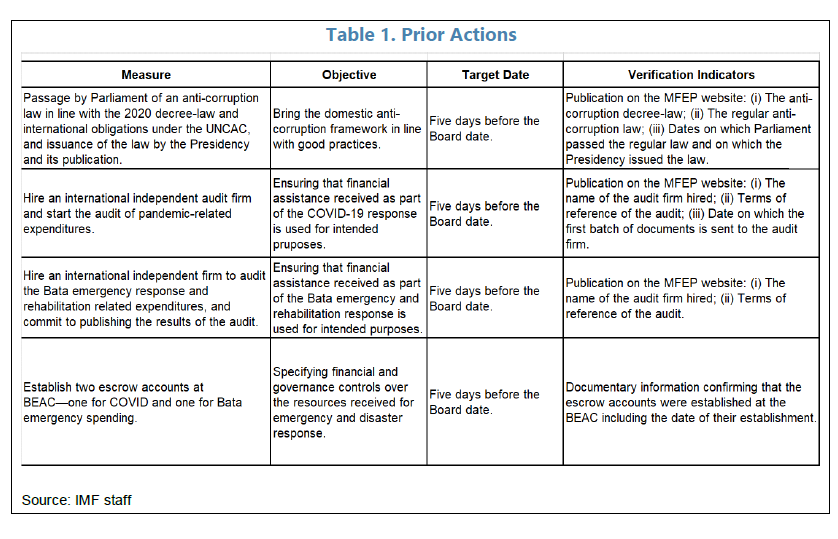Key Questions on Equatorial Guinea
Last Updated: September 17, 2021
Read the key questions regarding the IMF arrangements with Equatorial Guinea
Why does Equatorial Guinea need emergency support?
Already battered by a still unfolding COVID-19 pandemic, Equatorial Guinea was on March 7 struck by massive accidental explosions at a military compound in Bata, its largest city. The explosions killed over 100 people and caused widespread damage to surrounding neighborhoods. These shocks have adversely impacted economic activity and weakened the country’s fiscal and external positions, creating a substantial financing gap.
With the Extended Fund Facility-supported program (EFF) off-track, as governance reforms have taken longer than originally envisaged, it is not feasible to effectively respond to the humanitarian crisis within the EFF framework. Bringing the program back on track would take time as the authorities continue to work on outstanding structural measures while facing weak capacity as they address the COVID-19 pandemic and the fallout from the Bata explosions.
Equatorial Guinea meets the eligibility requirements for support under the Rapid Financing Instrument, as it has an urgent balance of payments need which, if not addressed, will result in an immediate and additional severe economic disruption. This balance of payments gap remains even after the August 2021 IMF Board of Governors approval of US$215 million SDR allocation for Equatorial Guinea.
What are the goals of the disbursement under the Rapid Financing Instrument?
On September 15, the IMF Executive Board approved Equatorial Guinea’s request for emergency assistance equivalent to about US$67.38 million under the RFI. The central objective of the RFI is to provide much needed resources to meet urgent funding needs arising from the widespread property destruction and loss of life caused by the Bata explosions, coupled with the growing scale and severity of the COVID-19 shock.
The resources are to be disbursed as direct budget support to cover the needs of the most vulnerable groups, compensate victims of the explosions, finance the pandemic response, and to boost much needed higher spending in areas like health and food security.
As RFI resources will cover only a fraction of such funding needs, additional external emergency support is required to cover the remaining needs. The authorities are therefore also seeking support from the international community and are committed to repatriating all available financial assets held abroad as soon as they become available.
Bringing the EFF-supported program back on track would also help to cover financing gaps, including by catalyzing donor support.
What transparency measures have been put in place to ensure that the resources are used appropriately?
Improving governance has been and remains an essential part of the IMF’s engagement with Equatorial Guinea. The authorities are taking steps to ensure that financial assistance is used for the intended purposes and all emergency spending is appropriately accounted for. To this effect, the authorities committed to a comprehensive set of governance and transparency measures under the RFI, and implemented four prior actions:
An anti-corruption law in line with international obligations and good practices was approved by Parliament and issued by the President.
Independent international firms have been hired to work on the audit of all spending related to COVID and the Bata emergency. The authorities are committed to finishing the audits and publishing the results on the Ministry of Finance’s website by end-September 2021 and end-April 2022, respectively.
To boost transparency, the authorities have established two escrow accounts at the Bank of Central African States (BEAC) for pandemic and Bata emergency-related spending—to be replenished by the existing BEAC IMF account where the RFI purchase will be made, with drawings from these accounts subject to the BEAC’s rules, including on transparency and anti-money laundering.
Moreover, the authorities will also adhere to good practices in procuring and awarding contracts related to the Bata emergency and pandemic response. They have committed to publishing the beneficial ownership information of companies that are awarded the contracts once the beneficial ownership regulations have been adopted and published.
To support the authorities’ commitments, Fund technical assistance is ongoing. Also see the table below for more details on the prior actions met by the authorities that support their governance, transparency anti-corruption reforms. More details of the authorities’ program can be found in the Staff Report on the RFI.

What is the economic outlook for Equatorial Guinea and what more is needed to ensure a sustainable growth path over the medium term?
The widespread destruction and loss of life in Bata along with the recent onset of a third wave of the COVID-19 pandemic have weakened the near-term outlook. Real non-hydrocarbon GDP growth for 2021 is projected at 2.2 percent, implying that real output at end-2021 will remain below its 2019 level.
The outlook is based on the expectation that the authorities can secure sufficient financing to commence the rebuilding, compensate victims and continue to respond adequately to the pandemic. It also assumes that global and domestic conditions will start to improve in the second half of 2021.
To ensure sustainable and inclusive growth, it is important to make further efforts to safeguard social spending and strengthen social protection. Regularization of government domestic arrears is key to support the recovery of the non-hydrocarbon economy, and strengthen the financial sector. Over the medium term, it is important to improve the business climate, including through continued governance reforms, in order to enable economic diversification.



